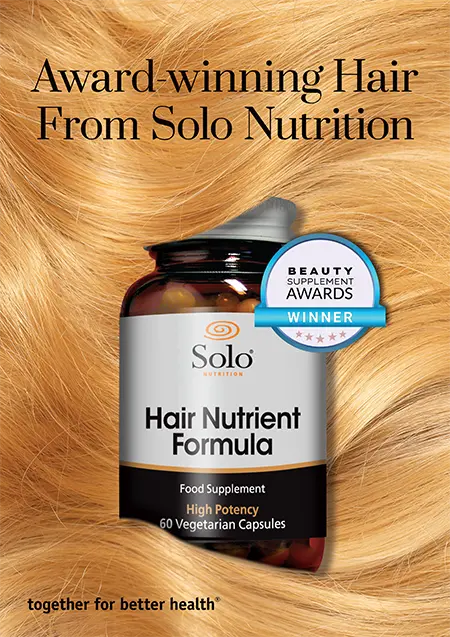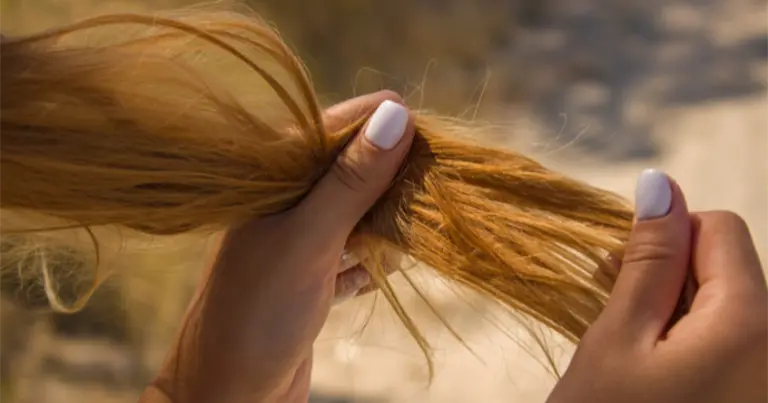These long winter months can leave us feeling run down – fighting winter bugs, dealing with a lack of sunlight (and therefore vitamin D) and having our energy spent just trying to stay warm. On top of all that, many of us might also notice a difference in our hair’s health in winter.
During winter, hair tends to suffer due to environmental changes. Cold temperatures reduce the natural moisture levels in the air, while indoor heating exacerbates the problem by further drying out the hair and scalp. Strong winds may also cause tangling and breakage, but wearing hats and scarves can lead to static and frizz. Hence, taming our locks in the winter weather can be tricky, and hair can start to appear dull, thin and lifeless. All it needs, though, is a little extra support and TLC, and we’re here to share some top tips for keeping your hair healthy in winter –
1. Protecting hair from heat

All many of us long for in winter is hot baths and half an hour with our backs pressed up against the radiator. After braving the cold outdoors, getting warm as quickly as possible is instinctive. Yet, it’s not necessarily what our hair and skin need. In fact, our skin and hair do not appreciate sudden changes in temperature.
The truth is, it’s not the cold weather that necessarily does damage. Sudden temperature changes, such as moving from cold outdoor air into a warm, centrally heated environment, can shock skin cells, causing moisture loss. This can leave skin dry and worsen conditions such as rosacea and/or eczema. As hair cuticles also react to temperature changes by expanding and retracting, when this occurs more, for instance, during winter, it can have an impact on hair structure, leading to brittleness, split ends and breakage.
Ironically, the most effective way to tame flyaway, dry, frizzy or lacklustre hair is to apply heat, but using heated styling tools is only going to worsen the issues.
Dramatic changes in temperature aren’t good for your locks, but we know how tricky it is to stay away from that radiator, put down the hair curlers and resist the pull of a bubble bath or hot shower. So here are a few simple but effective ways to protect your hair from heat:
Let your hair air dry wherever possible – whether from cold rain or hot bath water – drying naturally is kinder to your hair
- When using heated products on your hair, use a trusted heat-protect spray
- If you must stand beside the radiator, try to cover your hair so it’s less exposed to the direct dry heat
2. Reducing hair breakage in winter
Dry hair is vulnerable to breakage, but most breakage occurs when hair is wet, which is why it’s not a good idea to brush damp hair. Instead, softly use a towel to blot excess water out of your hair and wait until your locks are completely dry before brushing, as this pulls the hair and can cause snapping.
Avoid tight ponytails or plaits as they can put stress on roots and lead to breakage. You may also take particular care of hair ends by applying conditioner to them.
Lastly, hair trims will prevent split ends from travelling up the hair shaft and causing more damage, so keep your haircut appointments regular in winter months. Ideally, every 6-8 weeks.
3. Keeping your hair moist in winter

Your ultimate goal in winter is to keep as much moisture in your hair as possible. As with the skin, moisture in hair is procured through our natural oils, so we should be looking to support our natural oil production and keep our scalp healthy.
Essentially, no product or hair care routine will be effective long-term if your lifestyle isn’t giving you what you need, which is a healthy, balanced diet, regular exercise and good habits, such as drinking plenty of water. Foods high in healthy fats and omega-3s are especially good for natural oil production. These include – fatty fish, nuts, avocados, spinach, eggs, etc., so make sure you’re upping your intake to keep skin and hair nourished.
Conditioning hair is also important although over-washing can be harmful as it can strip it of our natural oils. Treatments such as leave-in hair conditioners and hair masks may also help to restore moisture and strengthen hair follicles. However, not all claims of restoring vitality can be relied on. Seek out ingredients that are drawn into the hair, rather than those that merely coat the hair.
You may also consider the materials your hair comes into contact with. Cotton, for example, absorbs natural oils whereas silk doesn’t which is why you might opt for a silk pillowcase. Hats can help protect hair both from harsh weather and heat but, again, certain materials may draw in natural oils charged with keeping our hair moist, strong and shiny.
4. Consider taking hair nutrient supplements in winter
Even those with healthy hair can see a change in condition during long winter months and it can be that no matter how carefully you care for your hair or how well you manage your diet, it may not be enough to combat the detrimental combined effects of wind, rain, cold weather and central heating.
 Therefore, some people may benefit from taking a targeted supplement like Solo Nutrition’s Hair Nutrient Formula. Packed with essential vitamins and minerals such as biotin, zinc, and B vitamins, this supplement helps support hair growth, improve strength, and combat seasonal hair shedding. As a recent Beauty Supplement Award-Winner, our marvellous hair nutrient formula is a firm favourite with those seeking to enhance the condition of their hair.
Therefore, some people may benefit from taking a targeted supplement like Solo Nutrition’s Hair Nutrient Formula. Packed with essential vitamins and minerals such as biotin, zinc, and B vitamins, this supplement helps support hair growth, improve strength, and combat seasonal hair shedding. As a recent Beauty Supplement Award-Winner, our marvellous hair nutrient formula is a firm favourite with those seeking to enhance the condition of their hair.
Keeping your hair healthy in winter
Although winter is beautiful and the crisp air can be refreshing, it can bring a number of challenges for our health and well-being. Battling with dryness and dull locks is not a problem anyone wants. Hopefully, though, this guide has provided you with the knowledge you need.
Now you know that your hair may be prone to dullness and breakage in winter because of the extremes in temperature. We know that we must lock in moisture and support our body’s natural ability to produce oils that help hair stay resilient, and there are a number of ways to do this. Essentially though, it is not what we put on our hair but what we put in our bodies that makes the most difference. So drink plenty of water, eat omega-3s and good fats and consider some extra nutrients in the form of supplements to give your hair the support it needs to stay bright, soft, strong and lovely all year long.



